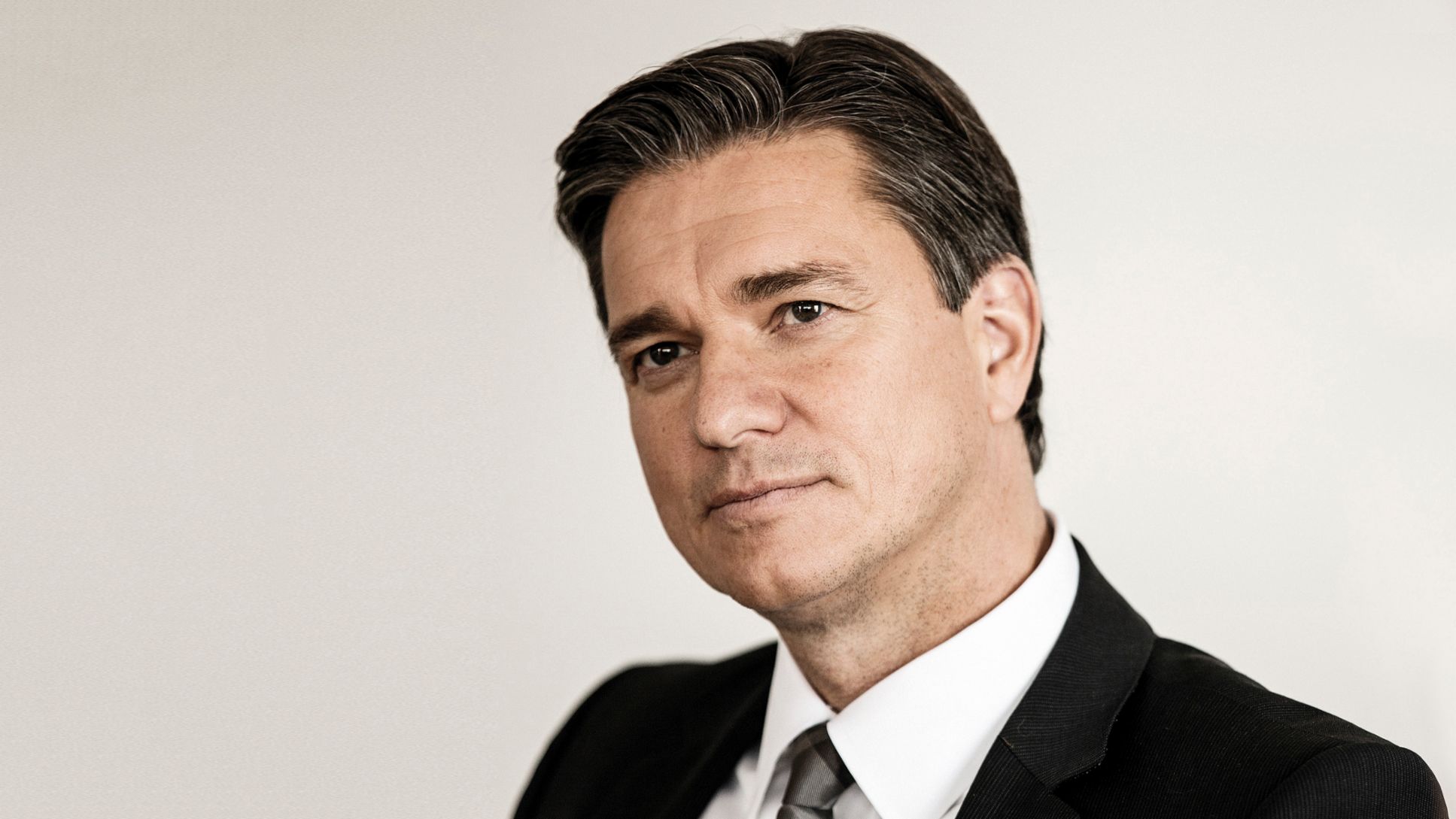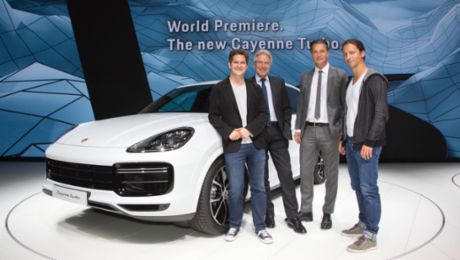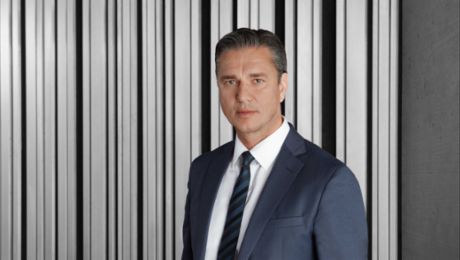The financial crisis, the Euro crisis, the economic crisis – things were not always easy over the last few years for international industry and many a group started to skid badly. The Zuffenhausen sports car manufacturer though has managed to maintain its course at a steady pace.
Lutz Meschke's contribution to this has been important. The business studies graduate began in 2001 as Head of Accounting in the Finance Department at Porsche. Three years later he was appointed Head of Controlling – and has been instrumental in the extensive cost reduction programme which the company embarked upon after the financial and economic crisis of 2008. And with no small amount of success, as the subsequent annual results show time after time.
Meschke's next natural step in his career path was to become a member of the Porsche Executive Board in 2009, responsible for Finance and IT, and on top of that be appointed Deputy Chairman of the Executive Board in October 2015 – deserved recognition of his work as Chief Financial Officer. Lutz Meschke summarizes his task succinctly: "My goal is for Porsche to remain the most economically successful car manufacturer in the long run."
2015: Exemplary success
High profitability and strict cost discipline make Porsche AG the most profitable car manufacturer in the world. The 2015 financial year was the most successful in company history – and just one example of their prudent financial policy. The number of employees has increased in the past five years from 13,000 to almost 25,000 (December 31, 2015).
But despite higher fixed costs through the increased workforce, despite massive investment in the Zuffenhausen, Leipzig and Weissach locations, despite increasing spending on pioneering research and development: with the efforts of Meschke and his team, Porsche was able not only to achieve the desired strategic target of 15 per cent return on sales, but even to exceed it by one percentage point. Sales revenue rose to € 21.5 billion (+ 25 per cent). Operating profit improved to € 3.4 billion (+ 25 per cent). And deliveries grew 19 per cent to more than 225,000 vehicles.
"Our higher turnover means we can generate additional profit contributions and can continue to invest," says Lutz Meschke. "So our sustainable growth helps fund our high expenditure on the development of new models." The introduction of the Macan resulted in increased personnel costs and capital costs. "And Porsche also had to invest heavily into modern drive concepts." Nevertheless, Porsche is well prepared. "Our healthy cost structure is an important success factor."
Currency hedging as a preventative measure
The control of currency risks is also an important focus for the Chief Financial Officer. "Porsche is well prepared for all kinds of crises," says the top manager. Even slumps in demand, as was the case after the Lehman collapse in 2008, could be shouldered by the company. A major challenge here is the hedge against currency risks.
Organisations like Porsche, who produce exclusively in the Euro area but sell worldwide, must be particularly vigilant in this area: "Without currency hedging, a somewhat stronger Euro would certainly mean a significant decline in earnings," Lutz Meschke explains. Porsche's financial difficulties 20 years ago were due also to currency problems. "We learnt from this long ago and secure ourselves flexibly within the major currencies for three to five years."
Porsche digital
In addition to Finance, IT plays an increasingly important role for Meschke. Digital transformation is a key issue at Porsche on all levels and is actively promoted with the IT Department taking the lead.
The Executive Board Member and his team provide the impetus – spreading through other corporate divisions: from research and development to purchasing right up to production processes and sales. And right up to the finished product: the driving experience on the road. Keywords: Connectivity and Infotainment. This creates new jobs at the sports car manufacturer itself; 1,000 new jobs alone for the electric Porsche Mission E in Zuffenhausen.
"In the future we will need more workers in the field of information technology." The business graduate sees a challenge in combining two professional worlds: "Computer enthusiasts are often ardent motorists too. We need young people from the digital world who want to carry full product responsibility at Porsche."
Promote sustainably
However, beyond everyday management, Lutz Meschke is looking to the next generation. Youth development is close to his heart – and it needs to be robustly costed if it is to make a lasting impact. So Porsche is involved with the Porsche Basketball Academy in Ludwigsburg, where about 2,500 children from the region regularly play basketball under professional guidance. And with the John Cranko Ballet School in Stuttgart, which was supported with ten million euros from the sports car manufacturer to assist with construction costs.
Meschke has a particular soft spot for football: the company supports the youth players of the second division RB Leipzig and Stuttgarter Kickers teams under the title "Turbo for Talent". "The latter provides far sighted and highly professional work in the field of young talent," he says. "We want to support club management with our commitment."
He is a passionate athlete in his personal life: as a central midfielder with FC Britannia 08 Solingen he made it to the national league. And although he now lives in the Baden-Württemberg state capital, works in Zuffenhausen and promotes the Stuttgarter Kickers, Lutz Meschke has remained true in his heart to his Rhineland home: his footballing heart beats for Borussia Mönchengladbach.
Lutz Meschke's career
Lutz Meschke gathered experience in other industries before joining Porsche: after the Hilden native completed his baccalaureate in Solingen in 1985, he decided to study business administration at the University of Cologne. With his degree in his pocket, he began his professional career in 1991 with KPMG, where he quickly rose to the position of audit manager, finally heading up the Company's Milan office. Still with the Milan air in his lungs, he moved to Swabia for the first time and to the fashion label Hugo Boss in Metzingen. He was responsible for leading the group consolidation from 1999 onwards.
In 2001 he took over as Head of Accounting at Porsche, and from 2004 was Head of Controlling. Since 2009 he has been Executive Board Member responsible for Finance and IT at Dr. Ing. h.c. F. Porsche AG, since October 1, 2015 he has also held the post of Deputy Chairman of the Executive Board at Porsche.

/b-S19_1087_fine.jpg/jcr:content/b-S19_1087_fine.jpg)


